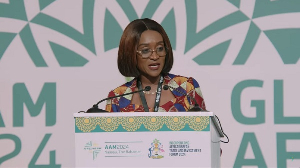"I dream of a Ghana where all our street and traffic lights work all the time! I dream of a Ghana where none of our factories stop production for lack of energy! I dream of a Ghana where all our communities, from Axim in the south to Zebilla in the north, have reliable and affordable power supply!”
Nana Akufo-Addo said, “This dream is based on my conviction that we can and must do better. I believe in Ghana and her future and so must you.”
And, as the over-filled to capacity Great Hall of the Kwame Nkrumah University of Science & Technology got on their feet to begin the standing ovation to the one hour vision statement on energy, the Presidential Candidate of the New Patriotic Party, concluded, “Together, government, citizens and civil society, let us work to invent the future that we seek. Let us build a modern free Ghana that we can bequeath to our children with pride.”
In setting up his energy vision, Nana Akufo-Addo went a step further than the earlier three flagbearers who spoke before him. He, in fact, situated his energy vision in his national vision to create a modern society by transforming the economy, with an accelerated growth rate of 10-12%, annually.
He said in order for this to be achieved, it would require increasing the country's energy capacity by three fold between now and 2020. The cost for this he estimated between $4-5 billion.
Payment for this would be done through public-private partnership and bond issues on the international capital market. Yet, this would require the country maintaining the prudent macro-economic discipline witnessed in the first seven years of NPP rule.
"Our vision," the Presidential Candidate said of the NPP, "is to develop an 'Energy Economy" that will ensure secure and reliable supply of high quality energy services for all to support the accelerated growth and development agenda of my government."
The primary objectives of the NPP’s energy policy platform will "encompass the goals of ensuring access to energy of choice, adequacy of supply, reliability of supply, affordability of energy supply and environmental sustainability," Nana said.
He promised to take Ghana nuclear, by disclosing some remarkable statistics about the doability of this: "Indeed, prototypes of such modern nuclear plants are under construction in the US, China, Russia and South Korea ranging in sizes from 65 MW to 285 MW. The expected capital costs range between US$1.2 million to US$1.5 million per MW. Hence a 400 MW nuclear power plant would cost about US$600 million to build, similar to the cost of the Bui Dam Project."
He alluded to a roadmap that is already being put in place, except, "The challenge, however, is how to demonstrate Ghana’s ability to manage and operate a nuclear power facility."
Nana said a lot will be done to seriously pursue the Brazilian model. To the admiration of Prof Frimpong-Boateng who sat by him on the podium, Nana even urged the KNUST to see how it could self-sustain its electricity supply by going for bio fuel.
Every region in Ghana "receives an average of 1900 hours of sunshine a year," Nana said to thunderous cheers from the crowd.
The cheers got louder when he said, his government would vigorously enforce planning regulations including those he seeks to introduce:
More work must be done to make solar installation cheaper because "it could be a viable and strategic source of energy security… For example, we could require by regulation, that from 2015, all new buildings must be solar dependent. That is, each new building put up after 2015 must have a roofing structure and strength to carry the necessary solar panels to make each building self-sufficient from solar energy. Excess electricity generated from these panels can be sold back to the electricity corporation."
He added, "Building owners who opt to be connected to the national grid will be paying a higher price for electricity. For existing buildings, we will consider providing tax incentives to convert them into solar sufficient buildings by 2020."
General News of Tuesday, 22 April 2008
Source: The Statesman
















